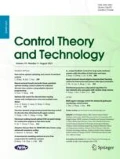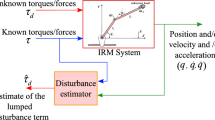Abstract
This paper presents the design, and validation of a new adaptive control system based on quasi-time delay estimation (QTDE) augmented with new integral second-order terminal sliding mode control (ISOTSMC) for a manipulator robot with unknown dynamic uncertainty and disturbances. Contrary to the conventional TDE, the proposed Q-TDE becomes sufficient to invoke a fixed artificial time delay and utilize the past data only of the control input to approximate the unknown system’s dynamic uncertainties. The incorporating of new adaptive reaching law with ISOTSMC augmented with Q-TDE policy ensures the continuous performance tracking of the robot manipulator’s trajectories using output feedback. This combination may achieve high performance with a significant chattering reducing procedure. By utilizing the Lyapunov function theory, it can be demonstrated that the robot system is stable and all signals in closed-loop are converging in finite time. Consequently, Simulation and comparative studies with two degrees of freedom robot manipulator were carried out to validate the effectiveness of the designed control scheme.
Similar content being viewed by others
References
A. Brahmi, M. Saad, G. Gauthier, et al. Adaptive control of multiple mobile manipulators transporting a rigid object. International Journal of Control, Automation and Systems, 2017, 15(4): 1779–1789.
J.-J. E. Slotine, W. Li et al. Applied Nonlinear Control. Englewood Cliffs: Prentice hall, 1991.
G. Rigatos, P. Siano, M. Abbaszadeh. Nonlinear H-infinity control for 4-DOF underactuated overhead cranes. Transactions of the Institute of Measurement and Control, 2017: DOI https://doi.org/10.1177/0142331217703702.
B. Brahmi, M. Saad, M. H. Rahman, et al. Cartesian trajectory tracking of a 7-DOF exoskeleton robot based on human inverse kinematics. IEEE Transactions on Systems, Man, and Cybernetics: Systems, 2019, 49(3): 600–611.
J. Zhou, C. Wen. Adaptive Backstepping Control of Uncertain Systems: Nonsmooth Nonlinearities, Interactions or Timevariations. Berlin: Springer, 2008.
E. Lundström, A. Terént, J. Borg. Prevalence of disabling spasticity 1 year after first-ever stroke. European Journal of Neurology, 2008, 15(6): 533–539.
D. S. Nichols-Larsen, P. Clark, A. Zeringue, et al. Factors influencing stroke survivors’ quality of life during subacute recovery. Stroke, 2005, 36(7): 1480–1484.
U. Keller, S. Schölch, U. Albisser, et al. Robot-assisted arm assessments in spinal cord injured patients: A consideration of concept study. PLoS ONE, 2015, 10(5): DOI https://doi.org/10.1371/journal.pone.0126948.
Y. Wu, X. Yu, Z. Man. Terminal sliding mode control design for uncertain dynamic systems. Systems & Control Letters, 1998, 34(5): 281–287.
A.-M. Hughes, S. B. Bouças, J. H. Burridge, et al. Evaluation of upper extremity neurorehabilitation using technology: A European delphi consensus study within the eu cost action network on robotics for neurorehabilitation. Journal of Neuroengineering and Rehabilitation, 2016, 13(1): DOI https://doi.org/10.1186/s12984-016-0192-z.
X. Yu, Z. Man. Fast terminal sliding-mode control design for nonlinear dynamical systems. IEEE Transactions on Circuits and Systems I: Fundamental Theory and Applications, 2002, 49(2): 261–264.
Y. Feng, X. Yu, Z. Man. Non-singular terminal sliding mode control of rigid manipulators. Automatica, 2002, 38(12): 2159–2167.
L. M. Fridman. An averaging approach to chattering. IEEE Transactions on Automatic Control, 2001, 46(8): 1260–1265.
C. J. Fallaha, M. Saad, H. Y. Kanaan, et al. Sliding-mode robot control with exponential reaching law. IEEE Transactions on Industrial Electronics, 2011, 58(2): 600–610.
A. Levant. Principles of 2-sliding mode design. Automatica, 2007, 43(4): 576–586.
T. Gonzalez, J. A. Moreno, L. Fridman. Variable gain supertwisting sliding mode control. IEEE Transactions on Automatic Control, 2012, 57(8): 2100–2105.
C. Evangelista, P. Puleston, F. Valenciaga, et al. Lyapunovdesigned super-twisting sliding mode control for wind energy conversion optimization. IEEE Transactions on Industrial Electronics, 2013, 60(2): 538–545.
S. Ding, J. Wang, W. X. Zheng. Second-order sliding mode control for nonlinear uncertain systems bounded by positive functions. IEEE Transactions on Industrial Electronics, 2015, 62(9): 5899–5909.
L. Zhao, J. Huang, H. Liu, et al. Second-order slidingmode observer with online parameter identification for sensorless induction motor drives. IEEE Transactions on Industrial Electronics, 2014, 61(10): 5280–5289.
A. M. Shotorbani, A. Ajami, S. G. Zadeh, et al. Robust terminal sliding mode power flow controller using unified power flow controller with adaptive observer and local measurement. IET Generation, Transmission & Distribution, 2014, 8(10): 1712–1723.
B. Brahmi, M. Saad, J. T. A. T. Lam, et al. Adaptive control of a 7-DOF exoskeleton robot with uncertainties on kinematics and dynamics. European Journal of Control, 2018, 42: 77–87.
B. Brahmi, M. Saad, C. Ochoa-Luna, et al. Adaptive tracking control of an exoskeleton robot with uncertain dynamics based on estimated time-delay control. IEEE/ASME Transactions on Mechatronics, 2018, 23(2): 575–585.
I. Karafyllis, M. Malisoff, F. Mazenc, et al. Recent Results on Nonlinear Delay Control Systems. Cham: Springer, 2016.
S. Roy, I. N. Kar. Adaptive-Robust Control with Limited Knowledge on Systems Dynamics: An Artificial Input Delay Approach and Beyond. Singapore: Springer, 2020.
A. Levant. Higher-order sliding modes, differentiation and outputfeedback control. International journal of Control, 2003, 76(9/10): 924–941.
H. Wang, Z. Han, Q. Xie, et al. Finite-time chaos synchronization of unified chaotic system with uncertain parameters. Communications in Nonlinear Science and Numerical Simulation, 2009, 14(5): 2239–2247.
J. A. Moreno, M. Osorio. A Lyapunov approach to second-order sliding mode controllers and observers. Proceedings of the 47th IEEE Conference on Decision and Control, Cancun: IEEE, 2008: 2856–2861.
Y. Wang, F. Yan, J. Chen, et al. A new adaptive time-delay control scheme for cable-driven manipulators. IEEE Transactions on Industrial Informatics, 2019, 15(6): 3469–3481.
R. Kelly, V. S. Davila, J. A. L. Perez. Control of Robot Manipulators in Joint Space. London: Springer, 2005.
Author information
Authors and Affiliations
Corresponding author
Additional information
Brahim BRAHMI received the B.Eng. degree from the Department of Electronic and Automatic, University of Science and Technology, Oran, Algeria in 2011, the Master’s degree in Computer and Control System from Lviv Polytechnic National University in Lviv, Ukraine in 2014. He received the Ph.D. in Engineering from the Ecole de technologie superieure (ETS) in Montreal, Quebec, Canada in 2019. With his thesis and specialization being in nonlinear control and robotics, he is currently a postdoctoral fellow with the Department of Mechanical Engineering, McGill University, Montreal, Canada. His research interests are in nonlinear control, adaptive control, robotics, rehabilitation robots, intelligent systems and machine learning.
Mark DRISCOLL is an Assistant Professor in Mechanical Engineering at McGill University, who focuses his research on musculoskeletal biomechanics with a primary interest in spine. Dr. Driscoll more specifically works to improve the understanding, from a biomechanical perspective, in low back pain and to devise devices to improve diagnosis or treatment thereof. One main project currently being developed is the conception and commercialization of a novel physics driven VR/AR surgical training device of a spinal operation with visual, audible and haptic feedback.
Mohamed-Hamza LARAKI was born in Benslimane, Morocco in 1993. He received his B.E. in Electrical Engineering from Ecole Nationale superieure d Electricite et de la Mecanique (ENSEM), Casablanca, Morocco in 2015. He is currently pursuing a Master’s degree in Ecole de Technologie superieure (ETS), Montreal, Canada. His area of interests includes development of smart power management strategies for stand-alone systems as well as power quality improvement.
Abdelkrim BRAHMI received the B.Sc. and M.Sc. degrees in Electrical Engineering from the University of Sciences and Technologies of Oran, Algeria, in 1997 and 2009, respectively, and the Ph.D. degree in Electrical Engineering from Quebec University (Ecole de Technologie Superieure), Montreal, QC, Canada. His current research interests include nonlinear control, and adaptive control applied to coordinated robotic systems.
Rights and permissions
About this article
Cite this article
Brahmi, B., Driscoll, M., Laraki, M.H. et al. Adaptive high-order sliding mode control based on quasi-time delay estimation for uncertain robot manipulator. Control Theory Technol. 18, 279–292 (2020). https://doi.org/10.1007/s11768-020-9061-1
Received:
Revised:
Accepted:
Published:
Issue Date:
DOI: https://doi.org/10.1007/s11768-020-9061-1




